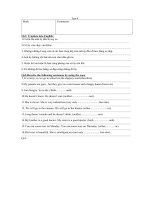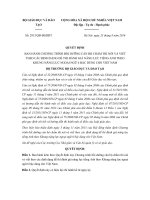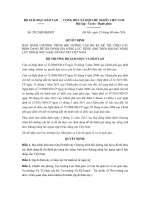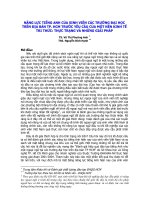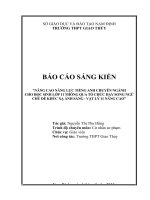PRACTISE TEST 2 test năng lực tiếng anh
Bạn đang xem bản rút gọn của tài liệu. Xem và tải ngay bản đầy đủ của tài liệu tại đây (48.79 KB, 5 trang )
PRACTISE TEST 2
Question 1 : Choose the best answer
1. This morning the postman was……down the street by my dog.
A. hunted
B. chased
C. run
D. sped
2. This child hurt himself badly when he fell ………the bedroom window.
A. out from
B. out of
C. down
D. over
3. He ……being given a receipt for the bill he had paid.
A. asked to
B. demanded
C. insisted on
D. required
4. I knew him ………I was a child.
A. until
B. when
C. as
D. during
5. I have absolutely no doubt ………innocerice of the accused.
A. about
B. over
C. on
D. with
6. Mr and Mrs Hudson are always………with each other about money.
A. annoying
B. arguing
C. discussing
D. shouting
7. When he left school, John decided to……..a priest instead of studying languages.
A. change to
B. become
C. train for
D. study for
8. I walked away as carmly as I could …..they thought I was the thief.
A. or else
B. to avoid
C. owing to
D. in case
9. I am late because my alarm clock never………this morning.
A. came on
B. rang out
C. went off
D. turned on
10. He…me to buy my air ticket immediately or it would be too late.
A. convinced
B. insisted
C. advised
D. suggested
11. Don’t worry about trying to catch the last train home, as we can easy……you up for the night.
A. take
B. put
C. set
D. keep
12. Take this road and you will……at the hotel in five minutes.
A. arrive
B. come
B. find
D. reach
13. I would like to offer a small…….to anyone who finds my missing dog.
A. receipt
B. repayment
C. expense
D. reward
14. The young girl carefully…..left and right before crossing the road.
A. watched
B. glanced
C. stared
D. looked
15. ……..people go to football matches now than twenty years ago.
A. Less
B. Lesser
C. Fewer
D. Few
16. He got out of bed and took a few ……but couldn’t go any farther.
A. stages
B. starts
C. steps
D. actions
17. You really can’t……a thing that woman says!
A. believe
B. rely
C. count
D. image
18. His performance was……; the audience was delighted.
A. unmarked
B. faultless
C. worthless
D. imperfect
19. But why did the police suspect you? it just does not make…..to me.
A. reason
B. right
C. sense
D. truth
20. Could you please tell me if you have any electric typewriters…….?
A. in store
B. in order
C. in supply
D. in stock
21. Two other……….in his argument for his country’s independence are worth a mention.
A. notices
B. points
C. effects
D. reports
22. He’s such a naughty child; it’s amazing what his mother lets him……away with.
A. go
B. make
C. do
D. get
23. The factory paid………nearly a million pounds to their employees who were injured in the
explosion.
A. off
B. out
C. back
D. in
24. Having…. the table, Mrs Roberts called the family for the supper.
A. laid
B. spread
C. order
D. completed
25. The little girl wouldn’t go into the sea………..her father went to.
A. except
B. but
C. also
D. unless
Question 2 : Fill each of the numbered blanks in the following passage:
In a village on the east coast of Scotland, people were waiting anxiously for news. Two of their
fishing-boats (1)_______ been caught in the storm (2) ______ had blown up during the night . In the
cottages round the harbour people stood (3) ________ their door , (4)________ worried to talk.
The rest of the fishing fleet had (5) _______ the harbour before dark , and the men from these ship
waited and watched (6) ______ the wives and families of (7) ______ misssing men . Some had (8)
________ thick blankets and some flasks to hot drinks, knowing that the men (9) _______ be cold and
tried . (10) ______ dawm began to break over (11) ______ the east, a small point if light was (12)
______ in the darkness of the water and a (13) ______ minutes later, (14) ______ was a shout. (15)
______ long, The two boats (16) ______ turning in , past the lighthouse, to the (17) ______ of the
harbour . The men (18) _______ helped out of their boats, and (19) _______ they were stiff (20)
______ cold and tiedness, they were all safe
Question 3: Finish each of the following sentences in such a way that it means exactly the same as
the sentence printed before it.
1. “I don’t think John will come”, said Bill
Bill doubted……………………………………………………………..
2. The postman was bitten by our dog.
Our dog………………………………………………………………….
3. We couldn’t drive because of the fog.
The fog prevented……………………………………………………….
4. Although his leg was broken he managed to get out of the car.
In spite…………………………………………………………………..
5. The cake was so hard so I couldn’t cat it.
It was…………………………………………………………………….
6. We didn’t go because it rained.
If it hadn’t………………………………………………………………..
7. I can’t cook as well as my mother does.
My mother………………………………………………………………...
8. I don’t suppose you have change for a pound, do you?
Do you happen……………………………………………………………
9. He failed to win the race.
He didn’t………………………………………………………………….
10. Mary rang hours and hourd ago.
It’s hours………………………………………………………………….
1. I haven’t been to a Chinese restaurant for ages.
It’s age _________________________________________________________________
2. The last time Nancy came here was in 1986.
Nancy hasn’t ____________________________________________________________
3. It’s a long time since our last conversation.
We ____________________________________________________________________
4. “I think you should go by train.” He told us.
He advised ______________________________________________________________
5. Julia cleaned the house. Then she went shopping.
After __________________________________________________________________
6. Jim was travelling in Paris. He met his old friends there.
While __________________________________________________________________
7. First Jane checked all the prices. Then she bought a new car.
Jane bought _____________________________________________________________
8. Jack went to Vietnam in 2002. He returned home in 2005.
Jack ___________________________________________________________________
9. They finished work and then left the office.
They __________________________________________________________________
10. We started learning English about 5 years ago.
We’ve _________________________________________________________________
Question 4:Word-form
1. This coffee is too ………………….…......to drink
( heat )
2. I really don't think he has the …...…..to do this job
(able)
3. The professor explained his ideas with great.……..
(clear)
4. Do you know what the……………..of the river is?
(deep)
5. He is a very ……………. …………………carpenter.
(skill)
6. He ………to hit me if I didn’t hand over my money
(threat)
7. He drives so ...…..that he is sure to have an accident
(care)
8. I am …………..he will succeed in his chosen career
(confidence)
Question 5 Reading comprehension
FIRST PASSAGE
The sun was going down beyond great banks of cloud which were full of orange-pink light. It
would usually be time for Joe to be going in, but he didn’t want to go back if Aunt Daisy and Uncle Ted
were still there, because his mother would only send him straight to bed out of the way. So he turned
away from home and walked down the lane past the football field, kicking a stone before him at the risk
of scratching the toes of his best brown shoes. A couple of dogs, one large, black and smooth-haired, the
other smaller with a long black and white coat, played on the edge of the field, running round, jumping
at each other and sometimes rolling over and over together, totally content in each other’s company.
Joe watched them for a moment or two and walked on. Twenty minutes later he was on the riverside and
halfway round the circle he had set out to walk from the town and back again. On his way he had passed
several couples and one or two family groups returning from their Sunday evening walk; but now there
was no one about except one man resting on the grass between the path and the river bank. When Joe
realised that it was his father, his surprise was so great that he stopped. Then his father, who had been
leaning on his arm and looking into the river, looked round, but did not seem surprised to see him.
“Hello Joe”, he said dully. He went back to staring at the river. The fact that he was wearing his best
clothes somehow added to the strangeness of his sitting there alone like this, and as Joe looked at him he
was conscious for the first time of a sense of his father as not his father, but as someone without
connection with himself: as a man, with thoughts and feelings outside their existence as father and son.
He saw, for the first time, his father as a person carrying about with him a world of his own, and he had
an indefinite sense of this world of his father’s extending back to a time and a life before he himself was
born. He was only a part of his father’s world, while his father belonged in the centre of his, Joe’s world.
And things were far from well in his father’s world, he knew.
He moved a few steps nearer, and his father did not look at him. “They’re all at home, wondering where
you are”, said Joe.
26) Joe didn’t go straight home because he ……
A/ didn’t want to see Aunt Daisy and Uncle Ted.
B/ wanted to find his father first.
C/ wanted to watch the two dogs playing.
D/ didn’t want to go to bed immediately.
27) Instead of going home Joe went …….
A/ on to the football field.
B/ through some fields.
C/ along the bank of the river.
D/ half-way to the town.
28) When Joe had completed half his intended walk he ……
A/ saw a man sitting by himself.
B/ passed a couple of people.
C/ went back to the town.
D/ met some family groups.
29) When Joe’s father saw Joe, he …….
A/ sat down on the grass.
B/ didn’t seem very interested in him.
C/ looked round at the river.
D/ went back to the river.
30) That evening Joe realised that …….
A/ he hardly knew his father at all.
B/ he had not seen his father wearing those clothes before.
C/ he had never really loved his father.
D/ his father had a life of his own.
31) That evening, Joe thought that his father was
A/ dull
B/ peculiar
C/ a stranger
D/ worried
SECOND PASSAGE
I cannot stress too much the importance of waching, your opponent, of knowing exaclly where
he is on the tennis court and what he is doing. lt is usually possible to work out the pattem of his game
very early in a match. Test him at the front of the court. Try hitting one or two balls up high to see what
his shots are like. the more quickly you discover his weaknesses the easier the match should become.
Now and again it may be a good idea to give your opponent an opportunity of making a mistake. if early
in the match, it seems that be is a very accurate player. but not a forceful one then you should tempt him
to play a winning shot. Give him the opening, for there are some player who simply cannot hit winners.
They will try to play an attacking game bul they carmot quite finish it off. The way to break up their
steady game may be by putting them into the front of the court. It is obviously wiser to try to decide at
the beginning or the match whether Your opponent is weaker on his lert-hand or on his right-hand side.
and then play a little more than fifty per cent of your shots down that side. Play a normal attacking
game, or the game you think you will win, but concentrate on the weaker side. A number of players
expenence more trouble than others in the back comers of the court - always be ready to recognise this
weakness Perhaps an opponent has a favounite backhand shot, but tacks certainty with his forehand
shot. Tempt him to play the forchand shot There are advantages in leaming as much as possible about
another player even before you play him. When you know. in a competition, who your next opponent
will be, try to watch him play beforehand. It is only under match conditions that his weaknesses are
likely to show - you are bound to pick up some information. even if It’s a basic thing such as slowness in
reaching the front or the court. The Australian team members always pool their knowledge of the team’s
opponents so that rarely does a member walk on to a court without knowing what to expect.
32. What are tennis players advised to do early in a match?
A Plan their own game carefully.
B Find out an opponent's weaker points.
C Test out a few new shots.
D Concentrale on playing acturatcly.
33 What should a playrer do against an opponent who has dirriculty in playing shots on one sidp?
A play on to his backhand at the front of the court.
B Play his usual game.
C Play more shots than usual to his opponent's weaker side.
D Play to the back comers or the court.
34. This passage tells a tennis player playing a match how to
A get an opponent to make mistakes.
B avoid making mistakes himself
C Play a steady game.
D play accurately rather than focefully
35. Before playing a match in a competition what is a player advised to do?
A Talk to members of his own team.
B Talk to his opponent beforehand
C Play a practice game against the opponent.
D Observe his opponent playing a match.
